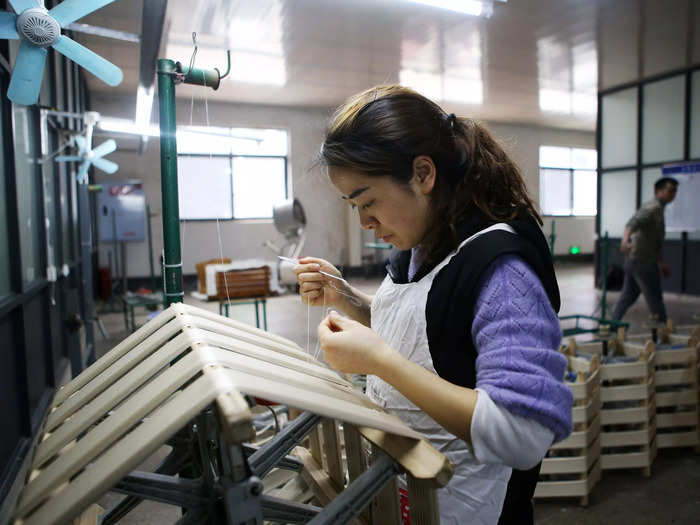- Home
- international
- news
- 7 college majors you can actually choose around the world, from e-sports in Korea to yodeling in Switzerland
7 college majors you can actually choose around the world, from e-sports in Korea to yodeling in Switzerland
Reena Koh

- In recent years, there has been a decline in the number of students enrolling in liberal arts degrees.
- As skill-based hiring is on the rise, students flock to technical majors or skip the degree altogether.
Team Sentinels' Tyson "TenZ" Ngo competes at the VALORANT Champions Groups Stage

In recent years, there has been a shift in perception of the purpose of a college, where many no longer see having a college degree as key to a successful career, according to Fortune.
On the other hand, more students are shunning liberal art degrees, according to The Hechinger Report. Many in the US are flocking to more technical degrees, per the US Bureau of Labor Statistics, and for good reason.
Skill-based hiring is on the rise, and companies are forgoing the typical degree requirements when seeking out talent. Instead, they are focusing on the job-specific skills that candidates offer, according to the Harvard Business Review.
As a result, more colleges are expanding their repertoire of majors offered to cater to students looking for more vocational courses, or simply to pursue their peculiar passions.
Here are the top seven most interesting college degrees that you can actually choose across the world, from e-sports in South Korea, to yodeling in Switzerland.
1. E-sports in South Korea

E-sports is a growing industry around the world, where revenue in the global eSports market is projected to reach $1.6 billion in 2023, according to Statista.
Osan University in Gyeonggi-do, a city that's around 30 miles away from Seoul, offers an e-sports major course to aspiring e-sports players and coaches.
According to the school's website, e-sports majors will graduate with several industry-related certificates, including e-sports referee qualification and international competition judge qualification.
A variety of future career options are available for e-sports degree holders, from e-sports player, to tournament commentator, and even potentially a game company employee, according to the school's website.
South Korea is home to some of the best e-sports players in the world, including "Faker," the highest earning League of Legends player in the world as of February 2023, according to Statista. The player was even offered a blank check by an American e-sports team at one point in his career, which he had turned down.
2. Manga studies in Japan

Anime is an international phenomenon, with many of its best works based on equally successful manga series. "One Piece," the world's most popular manga, broke its own Guinness World Record for publishing half a billion copies since its debut in 1997, per ONE Esports.
In 2021, the global manga market size was valued at almost $11 billion, according to a report by Grand View Research.
Kyoto Seika University in Kyoto, Japan, offers both a master's and doctoral program in their Graduate School of Manga, in addition to their five major courses of study — Cartoon Art, Comic Art, New Generation Manga, Character Design, and Animation — under their Faculty of Manga.
Some of their notable alumni include Kousuke Oono, author of popular the series "The Way of the Househusband," which was turned into a Netflix adaptation in 2021.
3. Circus arts in Australia

Cirque du Soleil, the world's largest contemporary circus producer, takes in more than $1 billion annually through performing in various cities across the globe, according to BBC.
Circus arts has been around since the 18th century, but there are not many available entry points to the industry to date.
The National Institute of Circus Arts in Melbourne, Australia offers a three-year Bachelor of Circus Arts program to circus artists looking for a platform in the industry or seeking a qualification.
The degree is the highest attainable level of accredited circus training in the country, according to the school's website.
4. Puppet arts in the US

Puppetry is an ancient art form with cultural variations in multiple countries. Each one is distinctly different from one another. The first recorded use of puppetry is estimated to be around the 5th century BC in Ancient Greece, according to Puppet Nerd.
"The Muppets," from the puppet franchise with more than 50 years of history, is the highest grossing puppet film, with more than $165 million in worldwide box office sales, according to IMDb.
The University of Connecticut in the US offers both a Bachelor's and Master's in Puppet Arts, where students get to explore and develop skills related to puppetry, from storytelling to sculpting.
The career options for graduates of the programs include fabricating for theatres, designing toys, and even directing prominent museums.
5. Tea husbandry and technology in India

India's Assam tea plantation industry just reached an important milestone of 200 years, as one of its very first tea estates was established back in 1823, according to The Economic Times.
Assam's tea has been renowned globally for its rich aroma and deep color, producing more than 1.5 billion pounds of tea every year. India accounts for more than a fifth of the global tea output, per The Economic Times.
The Assam Agricultural University in India offers both undergraduate and postgraduate studies in tea husbandry and technology, where students are trained to become technically qualified to further the tea industry, as well as to expand the applied research field of tea.
Acceptance to the program is tight, as only 20 spots open up each year. Five of those are reserved for applicants coming from other tea-growing states in India. Since the postgraduate degree program started in 1972, the school has had 635 students graduate from across India, along with 14 from foreign countries.
6. Silkworm studies in China

As the world's largest and earliest silk producer, China is well-known for its high-quality lustrous silk, accounting for almost 80% of the world's silk output, according to China Highlights.
Silk is also a luxury fabric known for its high price tag, as its availability is limited, and production of pure silk is often costly. Just two pounds of silk takes more than 5,000 silkworms to produce, not to mention the labor that goes into the process, according to Panaprium.
Shenyang Agricultural University in China offers a Bachelor's degree in silkworm, otherwise known as sericulture. The school has been offering the major for over 60 years, according to Xin Hua Net. The same source notes that only seven universities in China offer the major.
Shenyang is the most populous city of the Liaoning province, and is situated around 400 miles from Beijing, the capital of China.
Sericulture students will learn the art and skill of breeding and studying silkworms, expanding the research on the species that will contribute to the silk industry.
7. Yodeling in Switzerland

What started as a simple way to gather livestock or get the attention of other herders has evolved into a long-standing traditional art form over centuries.
First documented in Appenzell, Switzerland, in 1545, yodeling developed into singing in the 19th century when it started gaining worldwide traction, according to Time Out.
The Lucerne University of Applied Sciences and Arts in Switzerland offers a Bachelor's in Folk Music, of which the yodel is one of the typical folk music instruments that students can specialise in.
The school started to offer the course in 2018, though the then music department chair Michael Kaufmann had long dreamed of offering the degree but was unable to find a suitable teacher, according to Tribune de Genève.
Popular Right Now
Popular Keywords
Advertisement